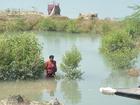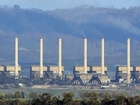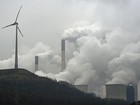A planet that is warming at extraordinary speed may require extraordinary new food crops. The latest great agricultural hope is beans that can thrive in temperatures that cripple most conventional beans. They're now growing in test plots of the International Center for Tropical Agriculture, or CIAT, in Colombia.
Many of these "heat-beater" beans resulted from a unique marriage, 20 years ago, of tradition and technology. The matchmaker was a Colombian scientist named Alvaro Mejia-Jimenez. But for almost two decades, his innovation sat on the shelf, unused.
 Full Story
Full Story
Ben Kravitz has studied geoengineering for the past seven years and doesn’t plan to stop anytime soon, despite ongoing controversy around the issue. That’s because even if geoengineering never happens in the real world, the concept alone is already playing an important role in the climate change story.
“[Theoretical geoengineering] has allowed us to ask questions about how the climate system works that we didn’t even know we wanted to ask,” says Kravitz, a researcher at the Pacific Northwest National Laboratory. “It’s actually in some ways changed the way I think about problems in climate science.”
 Full Story
Full Story
The entire country of Costa Rica is currently running on completely renewable energy and has been for 75 days now. Relying mainly on hydropower, Costa Rica has not used any fossil fuels to generate electricity since the beginning of 2015.
The heavy rainfall over the past year has kept hydroplants busy enough to power nearly the whole country, with geothermal, wind, biomass, and solar energy making up the deficit, according to a press release from the Costa Rican Electricity Institute.
 Full Story
Full Story
When Oslo sells the coal investments in its pension portfolio next month, it will set a historic precedent: the first capital city in the world to divest itself of that most polluting of fossil fuels. And the city is just the highest profile in a series of major urban areas that have made bold moves in recent weeks, ridding themselves of fossil fuel investments and becoming more carbon friendly.
Leichardt, Australia voted to completely divest from fossil fuels within three years, while Byron Bay announced the decision to commit to zero emissions. Smaller U.S. cities have already gotten on board in various ways, while last week in London, the GLA passed a motion asking the mayor to approve pulling City Hall’s pension fund out of all fossil fuel holdings. The list of cities that have divested appears set to grow ever longer.
 Full Story
Full Story
Across the country, there’s a growing trend toward the legalization of marijuana. Four states — Oregon, Washington, Colorado, Alaska — have voted to allow people to possess limited amounts of marijuana for personal use and also to let producers apply for licenses to produce and sell it. D.C. also just voted to allow personal possession. All of this is on top of the 23 states that allow it for medical reasons.
In some states, where businesses are also now legally cultivating and producing marijuana, a mainstream industry is emerging. Marijuana sales totaled $700 million in Colorado last year, for instance. But there’s a surprising catch. It turns out that indoor marijuana growth in particular — a cultivation method often favored in the industry for many reasons — uses a surprising amount of energy.
 Full Story
Full Story
Source: DW/M.Krishnan
The 140,000-hectare Sundarbans is one of the largest mangrove forests in the world, and a sanctuary for rare Ganges and Irabati dolphins, as well as the estuarine crocodile and Indian python. The UNESCO world heritage site is also home to over 500 Bengal tigers.
 Full Story
Full Story
Lisbon and Luxembourg rank last in a test of how hard European cities are fighting air pollution, while Zurich and Copenhagen come top, an environmental group said Tuesday.
Dublin, Glasgow, Madrid and Rome also fared badly in the test of 23 mainly western European cities carried out by Friends of the Earth Germany.
 Full Story
Full Story
Rice farmer Nguyen Hien Thien is so busy growing his crops that he has never even visited Can Tho, a town only a few miles from his farm in the southern Mekong Delta.
"When I was a child, we grew one crop of rice per year -- now it's three. It's a lot of work," 60-year-old Thien, who has been farming since he was a child, told Agence France Presse on the edge of his small paddy field.
 Full Story
Full Story
Australia on Saturday said it was inviting views from the public on what the nation's greenhouse gas emissions reduction target should be post-2020, before it announces the goal mid-year.
As countries prepare for a crucial U.N. climate meeting in Paris later this year, Australia said it was determined to reduce emissions -- but not via a carbon tax such as that imposed on industry by the previous Labor government.
 Full Story
Full Story
The global fund created to spearhead climate change financing has selected its first partners to channel funds to developing countries, but says it needs donor nations to move fast in transforming cash pledges into commitments.
At a three-day meeting that ended late Thursday, the board of the South Korea-based Green Climate Fund (GCF) approved seven intermediaries to funnel cash to projects in poor countries.
 Full Story
Full Story



